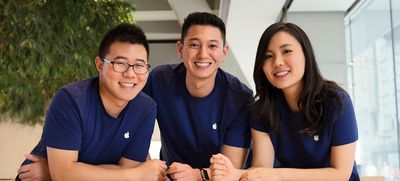Apple broke California law when it failed to pay employees for time spent waiting for mandatory bag searches at the end of their shifts, the California Supreme Court ruled today. [PDF]
The unanimous court decision, shared today by Bloomberg Law and The Los Angeles Times, dates back to a class action lawsuit filed against Apple in 2013.

Employees at the time alleged that Apple subjected them to mandatory bag checks that were conducted off the clock, leaving them uncompensated for their time. At the trial level, Apple actually won the lawsuit when the court ruled that Apple employees chose to bring personal bags to work and dismissed the case, but the decision was appealed and brought to a higher court.
The U.S. 9th Circuit Court of Appeals, which is now handling the case, asked the California Supreme Court to clarify whether California state law requires compensation, and the California Supreme Court ruled that the law does indeed dictate that employees be compensated while waiting for bag checks.
"Hours worked is defined as the time during which an employee is subject to the control of an employer and includes all the time the employee is suffered or permitted to work, whether or not required to do so," reads the court's opinion.
Based on the language of the control clause, Apple employees are entitled to compensation for the time during which they are subject to Apple's control. (Cal. Code Regs., tit. 8, Sn. 11070, subd. 2(G).) Applying a strictly textual analysis, Apple employees are clearly under Apple's control while awaiting, and during, the exit searches. Apple controls its employees during this time in several ways. First, Apple requires its employees to comply with the bag-search policy under threat of discipline, up to and including termination. Second, Apple confines its employees to the premises as they wait for and undergo an exit search. Third, Apple compels its employees to perform specific and supervised tasks while awaiting and during the search. This includes locating a manager or security guard and waiting for that person to become available, unzipping and opening all bags and packages, moving around items within a bag or package, removing any personal Apple technology devices for inspection, and providing a personal technology card for device verification.
Apple requires all personal packages, bags, and Apple devices that belong to retail employees to be checked by a manager or security before an employee is allowed to leave the store for any reason, including breaks, lunch, and the end of shifts.
Employees are also required to clock out before submitting to an exit search, and have estimated that the time spent waiting and undergoing searches ranges from five to 20 minutes. On busy days, some employees have waited for up to 45 minutes waiting for a bag check.
Apple has argued that allowing employees to bring bags and devices to work is a convenience and has positioned the searches as a "benefit" because employees could prevent searches by not bringing personal items or could be banned from bringing personal items all together. The California Supreme Court says that such a ban would be "draconian" and that Apple's arguments that employee iPhones are a convenience are "at odds" with how the iPhone is described in marketing materials.
"Its characterization of the iPhone as unnecessary for its own employees is directly at odds with its description of the iPhone as an 'integrated and integral' part of the lives of everyone else," reads the ruling.
The decision made today is retroactive, and the case will now return to the court of appeals where federal judges will apply the California Supreme Court's interpretation of the law. Prior evaluation of the case suggested that Apple could have to pay as much as $60 million should it be required to offer employees back compensation for the time spent undergoing bag checks.






















Top Rated Comments
Imagine how badly they treat their Chinese workforce?